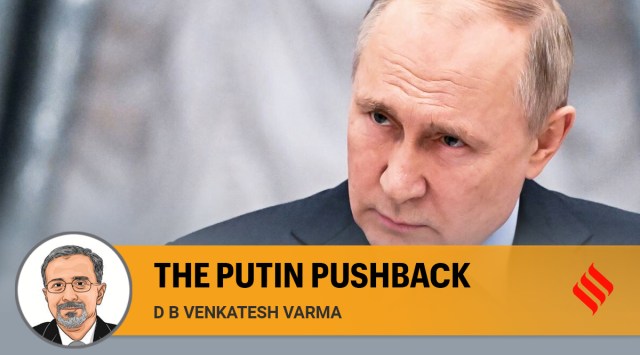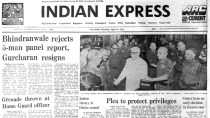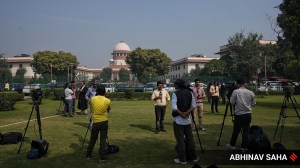- India
- International
Harsh lessons from the Ukraine crisis
D B Venkatesh Varma writes: Confrontation will drag the US down into a quagmire. What starts in Europe will not stay in Europe.
 Russian President Vladimir Putin speaks at a news conference in Moscow, Russia, Tuesday, Feb. 22, 2022. (Mikhail Klimentyev, Sputnik, Kremlin Pool Photo via AP)
Russian President Vladimir Putin speaks at a news conference in Moscow, Russia, Tuesday, Feb. 22, 2022. (Mikhail Klimentyev, Sputnik, Kremlin Pool Photo via AP)Russia’s recognition of Donetsk and Luhansk — the two breakaway regions of Ukraine — its decision to send “peacekeepers” and the still-evolving American and European reactions in terms of sanctions and other measures, offer stark lessons on the current nature of international politics. A crisis can be a cleanser of illusions and a clarifier of minds. This is surely one such.
That weakness is a sin is a harsh lesson that Russia has learnt since the Soviet collapse in 1991. The NATO expansion was a saga of false promises and unreal expectations. Gorbachev, Yeltsin, and even the ever-submissive Kozyrev were praised, ignored or lied to, but never respected or accommodated. Russia’s protestations were weak and sometimes confused, as with the NATO lollipop of a Partnership for Peace, a ruse which it fell for. Even President Vladimir Putin, in his early days, toyed with the idea of NATO membership. Each wave of NATO expansion brought the military alliance closer to Russia’s doorstep.
Today on its western borders, Russia is trying to wriggle out of a deeply disadvantageous situation that it was forced to accept out of weakness. Russia is not the Soviet Union. But it is also not the feeble power that it once was. With its military strength restored, it is employing aggressive means to defend its peripheries from US and NATO encroachment. Its actions are hugely destabilising, but are they unexpected? No. Which major power would accept unrelenting strategic encroachment in its immediate neighbourhood? After paying for its sin of weakness, Russia feels the time has come for a strong pushback.
Deafness is the twin brother of hubris. In the 1990s, Russia had no higher foreign policy goal than to be accepted by the West. This phase lasted until Putin’s 2007 Munich Security Conference speech — a remonstration against the strategic deafness in Washington. It was met with disdain and derision. The disastrous 2008 Bucharest Summit decision to put Ukraine and Georgia on the waiting list evoked the worst Russian fears and encouraged the comforting but false illusion in the two countries that the US and NATO would defend them against Russian aggression. In 2008, Georgia lost Abkhazia and South Ossetia. Ukraine has now been left to its own devices against Russian moves in the Donbas. For those in Ukraine, especially after the 2014 Maidan events, seeking distant protectors for proximate problems with Russia, these half-promises have proved lethal. Ukraine and Georgia are entitled to their rights of sovereignty and territorial integrity, but the entitlement alone cannot protect them from adverse consequences if these rights are pursued through diplomatic and military choices that yield the opposite results. Sadly, that is the case today.
Geopolitics is territorial genetics — it can be tamed but never erased. The NATO expansion has brought within its ambit territorial and ethnic disputes that have caused many European wars. NATO’s open-door policy on membership, strong in theory but disastrous in practice, has now reached its limits with the biggest crisis in European security since the 1990s. There is a yawning gap between its commitments and capabilities. Today’s NATO, with 30 countries, has fewer troops than the NATO of the 1990s, which had 16 countries. The failure of European powers — France and Germany, in particular — to rebuild European security outside the shadow of the US is now evident. America is back in Europe, reversing a major post-Cold War trend. Contrary to the “Beltway bubble analysis” (BBA), Russia is not seeking “limited sovereignty” in Central Europe — that is beyond its power. It is pushing back against states on its periphery that are conceding their sovereignty in favour of external military partners. But Russia’s success is not assured. In fact, a prolonged confrontation with indeterminate costs is inevitable.

Globalisation is judged by the margins of shared security and prosperity. Geopolitics, on the other hand, is driven by a country’s willingness to pay the costs and suffer for core interests. Russia, today, is one such power. Europe will be asked to pay for the costs of increased US-Russia confrontation, affecting its defence and energy interests. It will have no option but to comply — the hidden economic costs of a flawed security policy.
Double-front capabilities are a fallacy wrapped in a fantasy. No country in history has had the capability to fight simultaneously on two fronts on a global scale. Great Britain had India but was not able to prevail in its American colonies. Attacked by Japan in Pearl Harbor, the US ran a Europe-first strategy until late into the Second World War. The Soviets were bled dry due to the two-front mobilisations against NATO and China in the 1980s, even while fighting in Afghanistan. Even at the peak of its military power during the Cold War, the US planned major offensive operations in one theatre while seeking only enough military force for a holding operation in the second. The BBA would like us to believe that the US will be an exception to this historic trend. Forcing Russia to fight recurring fires on its western periphery — the Baltics, Ukraine, the Caucuses and the Black Sea — the West is opening the doors for China to expand its influence in Central Asia and the Far East. What starts in Europe will not stay in Europe.
The US today is a global power, first and foremost, because of its preponderant domination and influence over Europe. With a reinvestment in NATO, the American commitment to Europe will get stronger. Again, despite all the BBA optimism, there are serious material and policy difficulties for the US, at a time of great domestic divisions, to transition from being a Eurocentric global power to an Indo-Pacific one. The smaller countries from Eastern and Central Europe and their lobbies in Washington will torment the US for enhanced security commitments. The stage is set for the US to get bogged down in a European quagmire, creating long-term distortions in its global commitments.
India has taken a well-considered and balanced position on the evolving crisis. We owe answers to no one except ourselves. The 1997 Russia-NATO Act, the Budapest Memorandum and the Minsk agreements, quite apart from the key arms control agreements in Europe — the CFE, INF and Open Skies Treaty — were abandoned by many who want India to stand up and be counted for a “rules-based international order”. Russia has not covered itself in glory. But that is no reason to doubt the merits of our long-standing relations with it — just as we held our noses and deepened our relations with the US during its decade-long intervention in Iraq. Just as India should stand up against those countries that seek military domination on our borders, those in our neighbourhood should also take the lesson coming from the Ukraine crisis — offering your land to external powers to threaten others will only invite unhappy endings.
This column first appeared in the print edition on February 24, 2022 under the title ‘The Putin pushback’. The writer is former ambassador to Russia (2018-2021)
EXPRESS OPINION
More Explained
Apr 26: Latest News
- 01
- 02
- 03
- 04
- 05












































